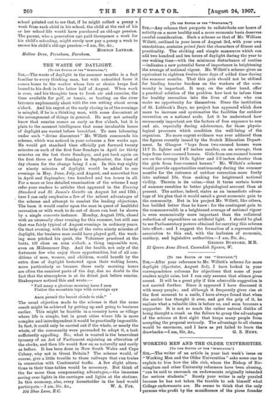[To THE EDITOR or THE "SPECTATOR. " ] Sin,—Any scheme that purports
to redistribute our hours of activity on a more healthy and a more economic basis deserves- careful consideration. Such a scheme as that of Mr. William Willett, outlined in your issue of August 3rd, with your own annotations, contains prima facie the characters of fitness and practicality. The striking and simple manoeuvre which can add two hundred and ten hours of daylight during the year to our waking time—with the minimum disturbance of routine —indicates a new potential force of importance in heightening the average of national vigour. Mr. Willett's scheme gives an equivalent to eighteen twelve-hour days of added time during the summer months. That this gain should not be utilised for binding heavier burdens on the workers of the com- munity is important. It may, on the other hand, offer a practical solution of the problem how best to infuse time for healthy recreation into the lives of those who can make no opportunity for themselves. Since the institution of St. Lubbock's Days, no project has appeared which does more to increase and systematise the facilities for outdoor recreation on a national scale. Let it be understood how enormously important are the factors of free exposure to sun and air, especially during adolescence, for those physio- logical processes which condition the well-being of the organism. No more cogent evidence was ever adduced than the figures recently issued by the Scotch Education Depart- ment. In Glasgow " boys from two-roomed houses were 11-7 lb. lighter and 4-7 inches smaller, on an average, than boys from four-roomed houses. Girls from one-roomed houses are on the average 14 lb. lighter and 5.3 inches shorter than the girls from four-roomed houses." Mr. Willett's scheme would provide opportunities continuously during the summer months for the entrance of outdoor recreation more freely into national life, thus making for heightened national virility. Therein is its value,—that it turns certain hours of summer sunshine to better physiological account than at present. The author, indeed, states as an immediate advan- tage of his plan that it would entail a great economic gain to the community. But in his project Mr. Willett, like others, has builded better than he knew : for the contingent gain to the commonwealth in a heightened average of national vigour is even economically more important than the collateral reduction of expenditure on artificial light. I should be glad to see Parliamentary powers obtained for carrying this scheme into effect : and I suggest the formation of a representative association to this end, with the inclusion of economic, sanitary, and legislative authorities.—I am, Sir, &c.,
GEORGE BURFORD, M.B.
35 Queen Anne Street, Cavendish Square, W.


































 Previous page
Previous page